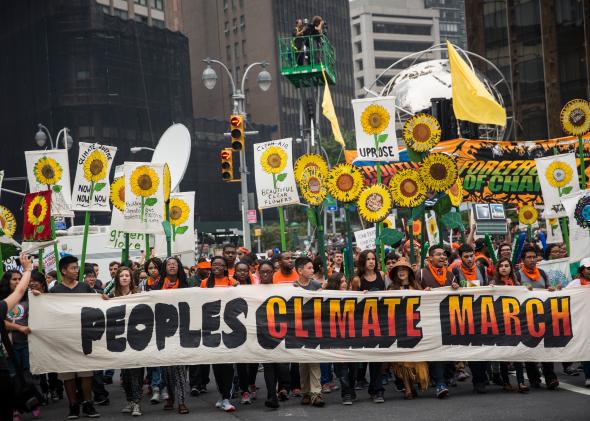We are all familiar with this hard truth: The world is barreling full-speed toward a fundamentally different climate, and we’re the ones responsible.
Not we as in the royal we—humanity, civilization, the West, or whatever—but actually we: you and me. We, as in, you, the one reading this article; and me, the one writing it.
The seemingly good news is that U.S. emissions have likely already peaked. Not so for China, where total emissions have doubled just in the last 10 years. But that’s missing the point.
In the run-up to the U.N. climate summit in New York last week came a story that seemed to resonate with our continued inability to take meaningful action on global warming: For the first time China’s carbon emissions have passed those of Europe, on a per-capita basis.
A New York Times interview with an author of that report heaped loads of blame on China, whose total emissions now surpass that of the United States and Europe combined. Earlier this month, a feature in Rolling Stone warned, “if the world’s biggest polluter doesn’t radically reduce the amount of coal it burns, nothing anyone does to stabilize the climate will matter.”
If that’s true, then those of us in the West are already doing as much as we can. We can hold up signs for a few hours on the streets of Manhattan, but when we hop back into our Priuses, we can rest easy knowing our responsibility for the problem is increasingly minimal.
But it’s just not true.
The average person in China (very different from China’s per capita emissions, which factors in things like factories that make goods for export) has a lifestyle that consumes far less carbon than the average American or European. In fact, it’s not even close.
One theory on the root cause of the recent plateau in U.S. emissions, besides the rise of fracking and America’s associated domestic oil and natural gas boom offsetting comparatively dirtier coal, is that we’re exporting our coal to places like the United Kingdom, the Netherlands, Brazil, and China. But the climate doesn’t care which country the extra carbon dioxide comes from. On the basis of lifestyle, despite our recent apparent improvements, nobody burns carbon like the good ol’ US of A.
According to chart above, which was compiled by Kevin Anderson of the University of Manchester, Americans still burn three times the amount of carbon per year as their Chinese counterparts. And Europeans, who currently claim some of the most ambitious (yet, still inadequate) carbon-cutting plans, still burn 60 percent more than China. The next global agreement on climate, scheduled to be debated next year in Paris, will try to take this inherent inequality into account. Archbishop Desmond Tutu of South Africa has called it “the human rights challenge of our time.”
I reached Kevin Anderson by phone on Monday.
“We have a very constrained carbon budget,” he says. “[E]very ton I emit, a poor person cannot emit. My ton is the same as a poor person’s ton, and once I’ve emitted it, they can’t.”
That concept of climate equity plays out within countries, too. “We’re not asking the poorer people in our own countries to cut back on their own emissions—we’re asking the wealthier people in our own countries to cut back on their emissions very rapidly.”
Anderson’s research shows that, without a radical carbon diet by the world’s wealthiest on the order of 10 percent per year starting immediately, there’s little hope to preserve a safe climate.
Seen through this lens, the divestment movement and the increasing focus on a rising China become a distraction to those of us with high-carbon footprints who have the power to make immediate changes in our own lives. Instead, leaders of the climate movement have increasingly set their sights on the fossil fuel industry itself as a target of activist angst. (After all, it’s much more fun to protest against Exxon than to protest against yourself.)
I tried to write this post without sounding pejorative or judge-y, because my intention is not to shame. But the fact is, if you agree with scientists that individual actions matter and there’s only a finite amount of carbon that can be emitted, every little bit counts. As much as I hate to admit it, that means those of us that emit more carbon than the global average are part of the problem.
For perspective, the 99th percentile of global annual income is shockingly low: roughly $33,000 per year. Most families making less than that probably don’t live a lifestyle that’s fundamentally at odds with a stable climate. Those of us who make more than that should start to think about ways in which we can adapt to a carbon-constrained future.
The debate over how to do this has focused almost exclusively on the rise of renewable energy, carbon capture, and other technological fixes that, in an ideal world, would contribute to a so-called deep decarbonization pathway on the macro scale. What’s rarely discussed is the role individual lifestyles play in bringing about the necessary sharp drop in emissions over the next few years. A carbon tax on individuals—not just businesses—could be the fairest way to do this, and would discourage carbon-heavy consumptive patterns while rewarding people that live within their planetary means.
The atmosphere is going through an unprecedented rate of change, at least in human history, and quite likely for millions of years beforehand. Why then, should we not expect an unprecedented rate of societal change necessary to stop it?
In his speech at the United Nations last week, President Obama said “we have to do more” to reduce our country’s emissions. Americans should start by taking a long hard look in the mirror.
